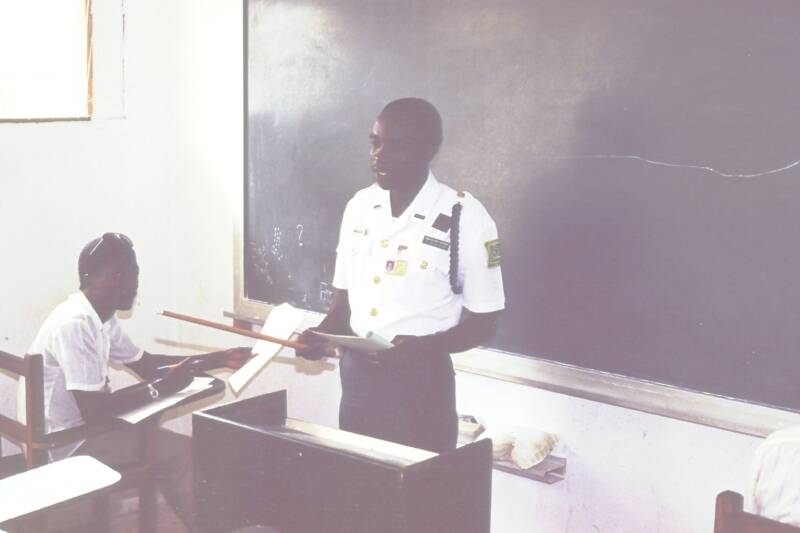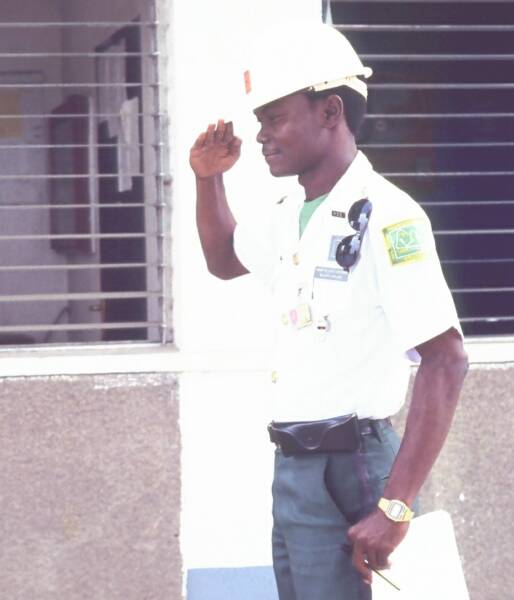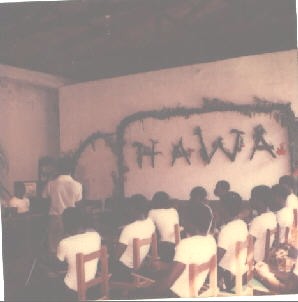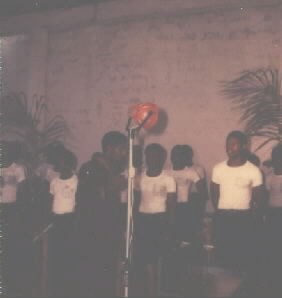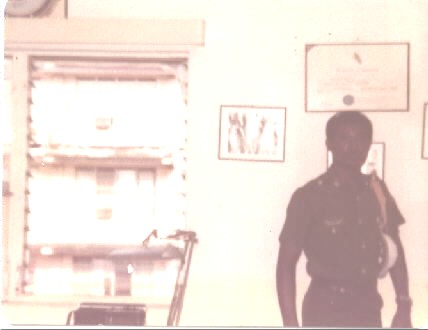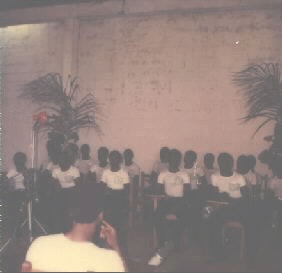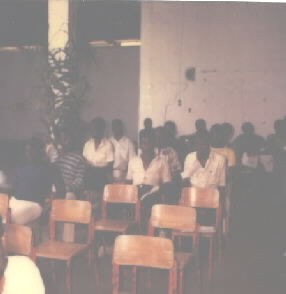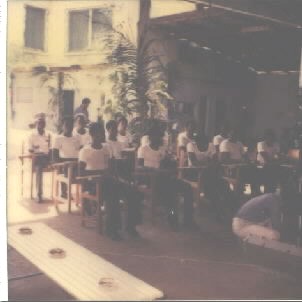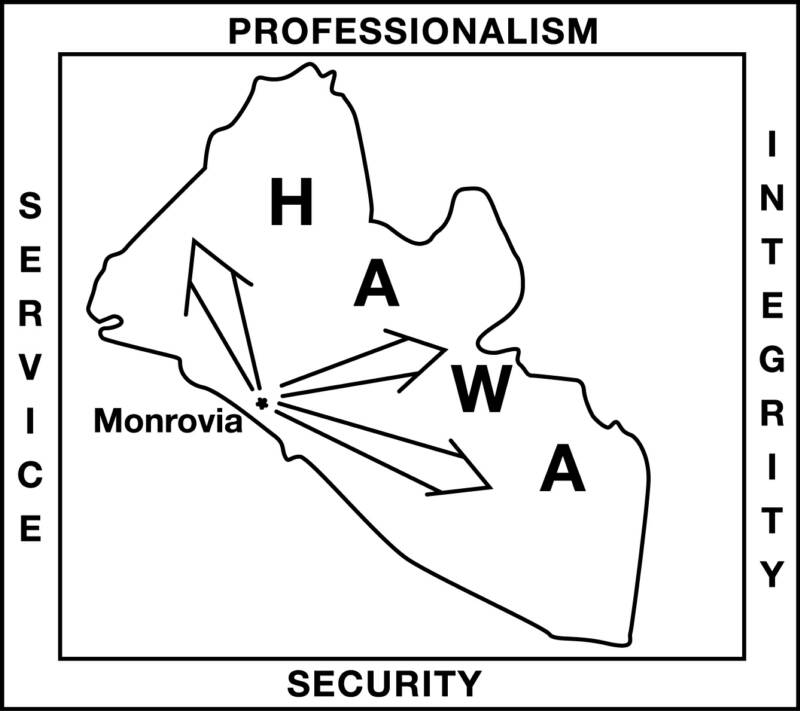HAWA Security Systems Training Institute
Training and Professional Development
When HAWA started its operation the Loss Prevention and Criminal Justice Training School was an essential part of the business, to augment the preparation of security personnel and enhance service to clients. The courses range from basic security preparation to advanced security administration courses..
Established in 1974, the HAWA Loss Prevention and Criminal Justice Institute also offered courses to private citizens on safety awareness, and civic duties and responsibilities. The HAWA Institute has received recognition from the Liberian Government, and is well respected within the community.
All students for training are vetted prior to class. All applicants have to be HIGH SCHOOL graduates from a recognized school by the Ministry of Education MOE). Every documentation provided is verified. The students must commit to three months of FREE training. Strict discipline is enforced in the classroom which is located on our facilities.
After the three months training 5 days a week, the student is given a 7 hours long test. There has been actual cases where a pencil was shown at the start of the test in the morning and by the ending of the test the pencil was actually down to about a third of the size!. The test is proctored by the Training Director and another special surprised visitor of the MD. The test is marked under strict standards and all test papers are viewed by the MD. Should any issues of honesty is detected by the MD, the Training Director would loose his job. There was no tolerance for this at the company.
Those who are successful were issued CERTIFICATES. The successful students were then interviewed for employment with HAWA. Those who were not successful during our interview were given the blessings of the company and allowed to leave with their FREE but honestly earned CERTIFICATE to look elsewhere for a job. Due to the respect that the Certificates held in the Liberian society, it was not difficult for them to find a job in security. Those who were not accepted however still would hound our Human Resources Manager for employment. There was something about working for HAWA that was different from the other places. Perhaps one day, the officers will be able to explain it themselves.
Those who were not successful, were given another opportunity to retake the ENTIRE three months class again and retake the test. Yes, many of them were successful upon the second try. But then, came the acceptance into HAWA, that was the difficult part.
The curriculum followed the American Society for Industrial security standard and added this with the professional training and materials obtained by the owner and founder of the company over his more than 20 years of experience. The officers were provided updated information and training approved and or recommended by the ASIS on a regular basis. HAWA security had received request for a correspondence course to be provided to a student in Sierra Leone. That was how far the reputation about HAWA Training had spread. We were working towards that a part of our expansion. In-Service training was the order of the day. If the security officer did not know what their duties were on the assignment, he was relieved and sent back to training. Fortunately those incidents were few and isolated.
Programs Include:
- Basic Security Officer Training (BSOT)
- Advanced Security Officer Training
- Government Security Guard Training
- Supervisory Training (see sidebar)*
- Report/Incident Writing Training
- Life Coaching - How to succeed. (see sidebar)**
Courses Being Offered
- Basic Security Guard Duties
- Security Standards Worldwide
- Supervisory Concepts in the Modern World
Schedule of classes: Start date pending
Questions? Click here .
Applications must include completed doctor’s assessment, immunization record, and emergency contact forms as well as the application fee of $Pending.
Students are notified by June 1 of placement. Enrollment priority is given to siblings of existing children. A wait list is available for mid-year openings.
Please call our office to request an enrollment packet and application.
Tuition & Fees
Information Pending
Training, Other Qualifications, and Advancement
Generally, there are no specific education requirements for security guards, but employers usually prefer to fill armed guard positions with people who have at least a high school diploma. Gaming surveillance officers often need some education beyond high school. In most States, guards must be licensed.
Education and training. Many employers of unarmed guards do not have any specific educational requirements. For armed guards, employers usually prefer individuals who are high school graduates or who hold an equivalent certification.
Many employers give newly hired guards instruction before they start the job and provide on-the-job training. The amount of training guards receive varies. Training is more rigorous for armed guards because their employers are legally responsible for any use of force. Armed guards receive formal training in areas such as weapons retention and laws covering the use of force. They may be periodically tested in the use of firearms.
An increasing number of States are making ongoing training a legal requirement for retention of licensure. Guards may receive training in protection, public relations, report writing, crisis deterrence, first aid, and specialized training relevant to their particular assignment.
The American Society for Industrial Security International has written voluntary training guidelines that are intended to provide regulating bodies consistent minimum standards for the quality of security services. These guidelines recommend that security guards receive at least 48 hours of training within the first 100 days of employment. The guidelines also suggest that security guards be required to pass a written or performance examination covering topics such as sharing information with law enforcement, crime prevention, handling evidence, the use of force, court testimony, report writing, interpersonal and communication skills, and emergency response procedures. In addition, they recommend annual retraining and additional firearms training for armed officers.
Guards who are employed at establishments that place a heavy emphasis on security usually receive extensive formal training. For example, guards at nuclear power plants undergo several months of training before going on duty—and even then, they perform their tasks under close supervision for a significant period of time. They are taught to use firearms, administer first aid, operate alarm systems and electronic security equipment, and spot and deal with security problems.
Gaming surveillance officers and investigators usually need some training beyond high school but not usually a bachelor’s degree. Several educational institutes offer certification programs. Classroom training usually is conducted in a casino-like atmosphere and includes the use of surveillance camera equipment. Previous security experience is a plus. Employers prefer either individuals with casino experience and significant knowledge of casino operations or those with law enforcement and investigation experience.
Training Is the Key *
When supervisors are new to the job, they don't know how to handle discipline (or hiring, firing, managing, or accommodating a disability, for that matter). It's not their fault—you didn't hire them for their HR knowledge so you can't expect them to act appropriately right out of the box.
But you can train them to do it. To train supervisors and managers effectively, you need a program that's easy for you to deliver and that requires little time out of busy schedules. Also, if you're like most companies in these tight budget days, you need a program that's reasonable in cost.
Most of all you need personnel who can relate examples into the society which they work.
Life after Layoff
HAWA is offering a special service to local businesses where we can assist you in helping to prepare your staff for terminations and or layoffs. What happens when they have to leave your company. What can they do.
There may be many reasons why an employee might have to leave the company - many of which might have nothing to do with criminal matters. Some people may not know how to find their ideal jobs - some may also be better at doing other things. This is what we try to do. Look for alternatives. So call us and see what we might have to offer your soon to be laid off personnel.
